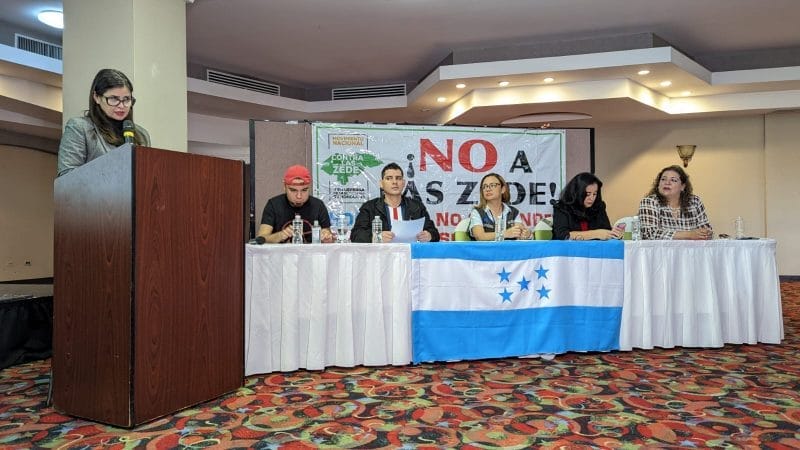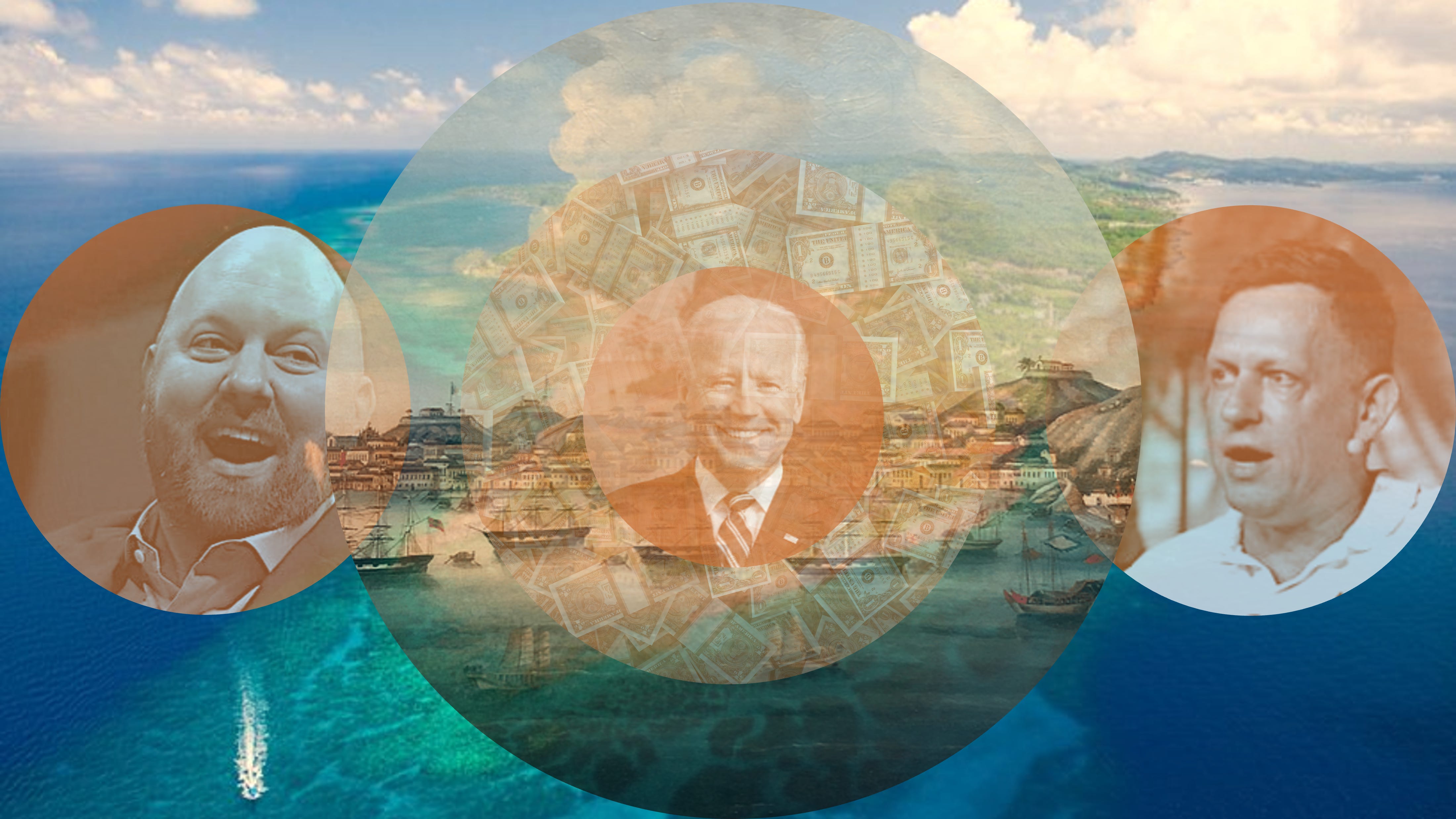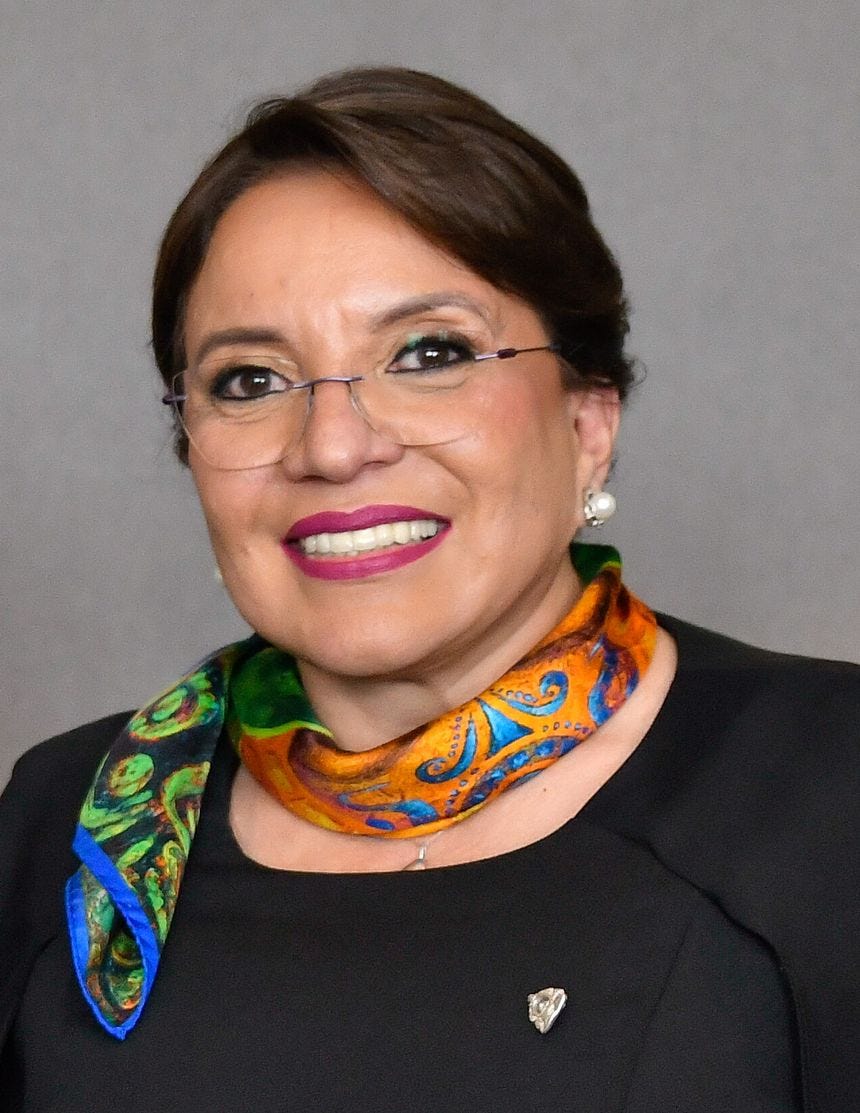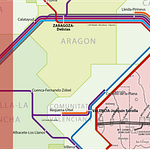Hello Interactors,
This is the last post on economics for 2023. Next up for winter is human behavior. This post bridges where we left off with traditional colonial nation-states by talking about how similar philosophies are motivating the formation of neocolonial micro-states. What causes people to seek freedom in new places by limiting the freedom of those found in such places?
Let’s dig in…
THE PURSUIT OF HAPPINESS
In 2009 the venture capitalist, techno-optimist, and libertarian political activist Peter Thiel ‘reasoned’.
“[he] no longer believes freedom and democracy are compatible.”1
He said,
“The great task for libertarians is to find an escape from politics in all its forms.”
Back then Thiel was introducing his ‘seasteading’ project — building or repurposing platforms in ocean waters not covered by international law as micro-nations.
He continues to lead his friends and followers, like tech mogul Marc Andreessen, toward these promised lands. They seek sophisticated legal spaces opportunistically drawn inside pre-existing territories with curious jurisdictions, legal structures, and rights. They take on names like ‘innovation hubs’ or ‘high-tech parks’ — techno-libertarian utopian ‘enclaves’ and ‘havens’ for those willing to adopt and adhere to their techno-optimist religion.
My last two posts talked about the creation of nation-states by powerful governments over the centuries and how they contributed to the current wars in Ukraine and Palestine. But there are also battles in the courtroom between these neocolonial libertarian venture capitalists and the people resisting colonization.
This is why, as The Economist says,
these libertarian colonies “will have their own government, write their own laws, manage their own currency and, eventually, hold their own elections.”2
And they have the backing of powerful European and U.S. governments. Sound familiar?
The original European colonial nation-states were qausi-governmental entities conceived by rich and powerful private entities to further enrich themselves — often at the expense of local people and land. It’s a concept that emerged out the European Enlightenment boosted by new scientific discoveries, technologies, and philosophies.
Thinkers like John Locke advocated for the concept of natural rights, including life, liberty, and property, which belonged inherently to individuals. These ideas inspired people to seek places where they could express personal autonomy and the freedom to pursue one's own goals and desires free of rule. This contrasted with long held beliefs that placed collective or communal goals above individual aspirations.
The Enlightenment is also often associated with the Age of Reason. Influential philosophers like René Descartes and Immanuel Kant emphasized the role of reason in understanding the world and making decisions. They argued that individuals should use their capacity for rational thought to question traditional authorities and beliefs, thus promoting a more individualistic approach to knowledge and truth. Reason is the hallmark of libertarian political philosophy today.
But they’re not alone. Rationalism has long been a cornerstone of human understanding, though faces many challenges today. Advances in neuroscience, cognitive psychology, and philosophy reveal that rationality is not a neutral tool but is often influenced by power structures, cultural biases, and subjective experiences. What is considered 'rational' can vary across different cultural and social contexts.
For example, the ‘rational actor’ theory on which mainstream economics rests doesn’t factor in confirmation bias — favoring information that confirms preexisting beliefs. A growing number of neuroscientists are revealing confirmation bias triggers activity in brain regions involved in reward processing, suggesting some biases may be rooted in fundamental neural mechanisms.
One of the preexisting beliefs of early Enlightenment thinkers, theologians, and colonial settlers is the idea that morality and ethics are not solely dictated by external authorities (like the church or state) but can be discerned through personal reasoning and rational introspection. This led to a more personal and individualistic approach to moral decisions. This may a form of confirmation bias suggesting moral principles should be followed out of a sense of personal duty over a duty to the community.
This shift played a crucial role in shaping modern Western societies, influencing everything from political theory to personal identity.
These ideas are intermingled in European colonialism and state-making. European powers, perceiving themselves as more 'civilized' and 'rational', used these beliefs to legitimize the domination of other peoples, whom they considered less enlightened or rational. This paternalistic view was used to rationalize the spread of European control and influence across the globe, often disregarding the autonomy and cultural values of colonized peoples.
While Enlightenment thinkers championed personal freedom and autonomy, these ideals were selectively applied. Colonial powers often deny these rights to the people in their newly formed colonies, leading to a glaring contradiction between Enlightenment ideals and colonial practices. This paradox is what fuels anti-colonial movements to argue for independence and self-determination just as colonizers did against their religious, feudal, and imperial tyrants.
The individualistic approach to morality and ethics of the Enlightenment era led to significant debates and critiques regarding the moral implications of colonialism that are alive today.
Some Enlightenment thinkers, like Denis Diderot, Rousseau, and Voltaire and later the abolitionists, criticized colonialism and slavery on moral grounds. Even early American colonizers like Roger Williams, John Woolman, and Thomas Paine criticized the inhumane treatment of Native Americans and the unjust rights of exploitation of land and labor. However, the cloak of moral and civilizational superiority ultimately justified colonial practices then and now.

LIBERTY AND JUSTICE FOR ALL
Are these neocolonial ‘zones of opportunity’ just another cloak of moral and civilizational superiority that ultimately justifies total disregard for the autonomy and cultural values of the local people and land? And like other attempts to support colonization, are they endorsed by powerful governments and Western financial institutions? Yes, they are.
In 2013, the Honduran government under President Juan Orland Hernández, after controversially reconstituting its Supreme Court, passed the "ZEDEs law" to create "Zones for Employment and Economic Development." These zones, inspired by former World Bank Economist Paul Romer's Charter City concept, involved selling Honduran territory to foreign investors at low costs.
The Society for the Socioeconomic Development of Honduras, later known as Honduras Próspera LLC, was established in Biden’s home Company State and tax haven, Delaware.
Próspera is funded by Peter Thiel and Marc Andreesen and was envisioned as a libertarian utopia.
They want to develop a ‘zone’ in Crawfish Rock, a small, historically significant community located on the island of Roatán, part of the Bay Islands in Honduras. Its English-speaking origins can be traced back to the early 19th century when the British Empire exerted influence over the region, leading to a significant influx of English-speaking Black Caribbean descendants.
Over the years, Crawfish Rock has maintained its unique cultural and linguistic identity, with English remaining the primary language, a testament to its historical ties to the British colonial era and the diverse migration patterns in the Caribbean. An organization has formed to protect these people, their homes, and their heritage — as well as other areas like it in Honduras from ‘neocolonial invasion’.

The Vice President of the Crawfish Rock governing council Venessa Cardenas Woods put it plainly,
“If you take away our land, if you take away our cultural heritage, our way of living, you take away everything, the entire identity of the group as English-speaking blacks, then you would be eliminating an entire people.”
Meanwhile, Prospera’s President, Joel Bomgar, who also happens to be a member of the Mississippi House of Representatives, believes,
“The concept of free private cities and charter cities, specifically what Próspera is trying to do, is the most transformative project in the world.” 3
Bomgar previously started and then sold a remote access software company for support technicians.
Lest you think this is purely a conservative GOP libertarian affair, it was the Obama administration that created a “U.S. Strategy for Engagement in Central America.” Optimistically stating,
“While the United States will need to invest significant resources in such an effort, the success of the strategy will depend far more on the readiness of Central American governments to continue to demonstrate political will and undertake substantial political and economic commitments to bring about positive change in the region.”4
Their efforts and dollars instead supported a government coup and the rise of Hernández which ultimately reshaped the Honduras constitution, reassembled the supreme court, and forced the formation of U.S. backed ‘zones’ into law. The coup was unanimously condemned by the UN General Assembly.
In a made-for-tv twist, fast forward to 2022, Honduran President Juan Orland Hernández was arrested, detained, and then extradited at the request of the United States government on drug and arms charges. The Hondurans then elected Xiomar Castro as the country’s first female president. She is also the wife of Manuel Zelaya who was ousted in the coup. Her mandate is political platform, social justice, poverty reduction, and opposition to neoliberal policies.
She wasted no time. The Honduran Congress voted unanimously to repeal ‘zone’ laws and appointed a committee to oversee their elimination. Próspera also wasted no time. Months later the corporation filed a $10.7 billion dollar claim against the Honduran government. This equates to 80% of the Honduran total governmental expenditures. They claim it’s a violation of the U.S. Central American Free Trade Agreement (CAFTA-DR).
Members of the U.S. Congress and Biden administration sought to defend and expand CAFTA provisions to further protect U.S. investments. This system of public-private strong-arming of weaker countries is embedded in U.S. bilateral investment treaties. It can create legal and power imbalances that allow corporations to sue governments for regulations affecting profits without reciprocal accountability for corporate crimes — including violations of the very labor laws and environmental protections Libertarians seek to avoid in the creation of their so-called ‘havens’.
The Biden administration's approach to international trade law and the ongoing case of Honduras challenges existing trade norms. Honduras is actively resisting this system, with President Castro's government seeking to reform the international trade system and restrict corporate power from neocolonial expansion.
As Honduras prepares to lead the Community of Latin American and Caribbean States (CELAC) in 2024, this issue is set to become a central topic in hemispheric discussions. The case underscores the importance of eliminating unfair provisions from U.S. trade agreements to safeguard democracy against corporate interventions. The stakes are high, not just financially but also in terms of the autonomy of cultural values, community identity, and environmental protections.
Crack-Up Capitalism. Market Radicals and the Dream of a World. Quinn Slobodian. 2023.
Why is Biden Endorsing Corporate Colonialism in Honduras? David Adler, José Miguel Ahumada. The Law and Political Economy Project.
Ibid
National Movement Against ZEDE reactivated in the face of a neocolonial invasion. Marcia Perdomo. Environment and Extractivism, Featured News. criterio.hn.















